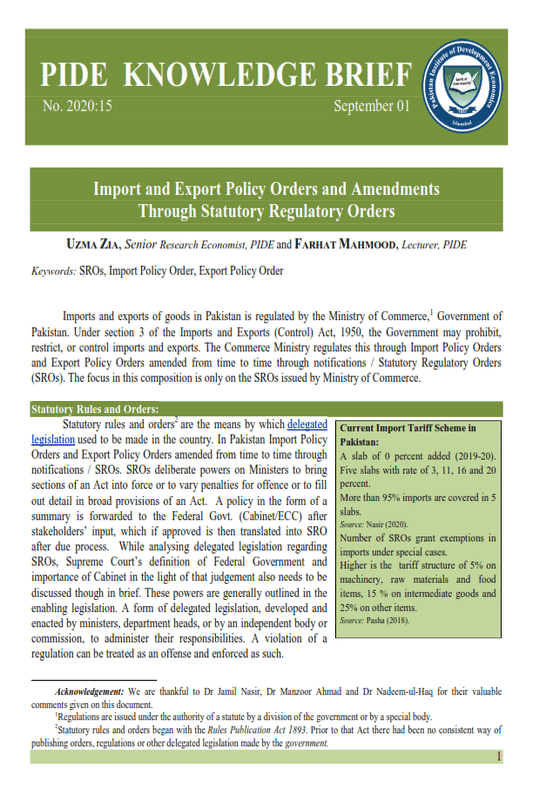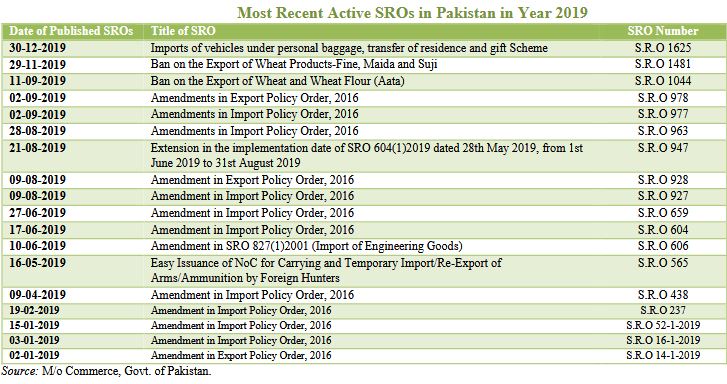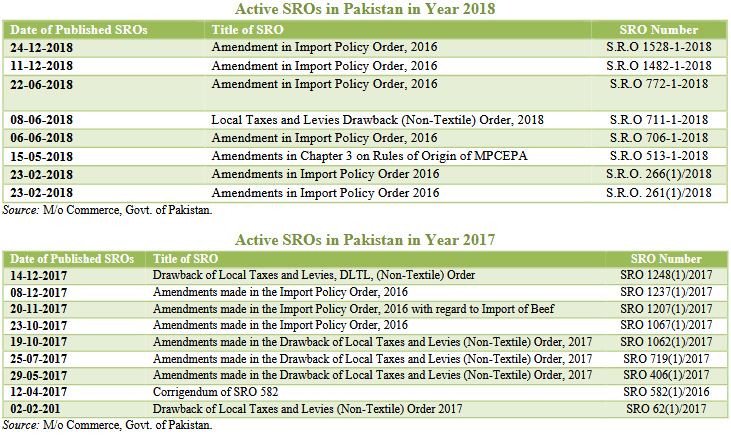
Pakistan Institute of Development Economics
- Home
Our Portals
MenuMenuMenuMenuMenuMenuMenu - ResearchMenuMenuMenuMenuMenuMenuMenu
- Discourse
- The PDR
- Our Researchers
- Academics
- Degree Verification
- Thesis Portal
- Our Portals
Import And Export Policy Orders And Amendments Through Statutory Regulatory Orders (PIDE Knowledge Brief No. 15:2020)
Import and Export Policy Orders and Amendments Through Statutory Regulatory Orders
Uzma Zia, Senior Research Economist, PIDE and Farhat Mahmood, Lecturer, PIDE
Keywords: SROs, Import Policy Order, Export Policy Order.
Imports and exports of goods in Pakistan is regulated by the Ministry of Commerce,[1] Government of Pakistan. Under section 3 of the Imports and Exports (Control) Act, 1950, the Government may prohibit, restrict, or control imports and exports. The Commerce Ministry regulates this through Import Policy Orders and Export Policy Orders amended from time to time through notifications / Statutory Regulatory Orders (SROs). The focus in this composition is only on the SROs issued by Ministry of Commerce.
Statutory Rules and Orders:
Statutory rules and orders[2] are the means by which delegated legislation used to be made in the country. In Pakistan Import Policy Orders and Export Policy Orders amended from time to time through notifications / SROs. SROs deliberate powers on Ministers to bring sections of an Act into force or to vary penalties for offence or to fill out detail in broad provisions of an Act. A policy in the form of a summary is forwarded to the Federal Govt. (Cabinet/ECC) after stakeholders’ input, which if approved is then translated into SRO after due process. While analysing delegated legislation regarding SROs, Supreme Court’s definition of Federal Government and importance of Cabinet in the light of that judgement also needs to be discussed though in brief. These powers are generally outlined in the enabling legislation. A form of delegated legislation, developed and enacted by ministers, department heads, or by an independent body or commission, to administer their responsibilities. A violation of a regulation can be treated as an offense and enforced as such.
| Current Import Tariff Scheme in Pakistan: A slab of 0 percent added (2019-20). Five slabs with rate of 3, 11, 16 and 20 percent. More than 95% imports are covered in 5 slabs. Source: Nasir (2020). Number of SROs grant exemptions in imports under special cases. Higher is the tariff structure of 5% on machinery, raw materials and food items, 15 % on intermediate goods and 25% on other items. Source: Pasha (2018). |
Powers to Prohibit, Restrict, and Regulate:
“The Federal Government may, by an order published in the Official Gazette and subject to such conditions and exceptions as may be made by or under the order, prohibit, restrict or otherwise control the import and export of goods of any specified description, or regulate generally all practices (including trade practices) and procedure connected to the import or export of such goods and such order may provide for applications for licenses under this Act, the evidence to be attached with such applications, the grant, use, transfer, sale or cancellation of such licenses, and the term and manner in which and the periods within which appeals and applications for review or revision may be preferred and disposed of, and the charging of fees in respect of any such matter as may be provided in such order” (Section 3 of Import and Export Control Act, 1950).
| Concessional SROs and estimated amount of imports : Exemption of duty in imports under SROs (issued in 2018): 9390.33 (Rs in Millions-estimated) Source: GoP(2020) Against the total imports of Rs. 4.01 trillion, Rs. 2.39 worth of imports were duty free. Out of total 6808 tariff lines (8-digit), 3950 draw in SROs. Source: Ahmad and Ather (2014) Concessionary imports has significantly reduced over time and the cost of concession have also reduced significantly over time. Source: NTC (2015) |
______________________________
Acknowledgement: We are thankful to Dr Jamil Nasir, Dr Manzoor Ahmad and Dr Nadeem Ul Haq for their valuable comments given on this document.
[1]Regulations are issued under the authority of a statute by a division of the government or by a special body.
[2]Statutory rules and orders began with the Rules Publication Act 1893. Prior to that Act there had been no consistent way of publishing orders, regulations or other delegated legislation made by the government.
Thus, the powers with regard to import and export can broadly be divided into following three categories.
- Power to Prohibit—no entry or no exit of goods from the boundaries of Pakistan.
- Power to Restrict—entry and exist subject to certain stipulation e.g. licences, NOCs and quotas etc.
- Power to Regulate—Procedures import and export e.g. what documents shall be required for clearance at the time of import and export? What would be the steps involved in clearance of goods at the ports etc.
The Government can prohibit or restrict imports by notification (Customs Act, section 16), and ban imports from all or any source if considered in the “public interest”. Such measures are contained in the Ministry of Commerce’s Import Policy Order. Certain imports are restricted unless they meet specified conditions, such as prior approval or clearance, passing certain testing arrangements, or satisfying procedural requirements. Most measures are mainly for health, safety, security, and environmental reasons (they include imported second-hand specialized vehicles, ships, trawlers, aircraft and related parts, and equipment). Imports are subject to the same national quality standards or regulations as similar domestically made goods. The Import Policy Order list of prohibited imports is updated during the year, at the request of the affected Ministry/Department/Group. Despite having delegated power, the Ministry of Commerce rarely issues any SRO unless the decision is approved by the ECC or the Cabinet.
Moreover, the Ministry of Commerce, sometimes announces export policies and measures at budget time as part of its Trade Policy.While some are announced even after the budget. Exports are allowed unless listed in Schedules I or II of the Export Policy Order. Exports of imported goods in their original and unprocessed form are generally prohibited.
Government of Pakistan has two most recent policy orders: Import policy order (15-18) and Export policy order (15-18).[3] Time to time different SROs are introduced. The SROs of last three years are compiled below:
__________________________
[3] Available on website of M/o Commerce Govt. of Pakistan.
For illustration of nature and significance of SROs issued by Ministry of Commerce, it is relevant to mention here the details of a few newly introduced SROs tabulated above. Currently Pakistan is passing and managing the pandemic situation and demand of protective equipment has increased. SRO 239(I)/2020 dated 24.03.2020 has been superseded by SRO 526(I)/2020 dated 09.06.2020. Now only three items i.e. Tyvek Suits, Surgical Masks and N-95 Masks are banned for exports. A timely step has been taken by government by amending Export Policy Order and imposing a ban on export of personal protective equipment. The SRO 239 also explained the ban lapse condition which was indicated upon completion of the process of assessment of the baseline requirements of the country and stockpiling to be notified by the government. In current situation it is more essential to fulfill domestic health safety needs in the country instead of exporting important equipment.
Similarly, the ministry of commerce has made decision in SRO 238 about imposition of ban on exports of onions. As explained in SRO the ban will lapse on the 31st day of May, 2020. The government sources announced enough onion production to meet the local demand and a ban is imposed as the government want to control the prices of onions. Similarly several other SROs are being issued in previous years and are listed in the next section.
The culture of the SROs has deeply entrenched itself in Pakistan’s trade market because of the legislative powers delegated by Cabinet through laws. By definition, the use of SROs should be restricted to framing rules and procedures for implementing a law. SROs are generally written by an administrative body to ensure that the law and regulations are applied fairly to all parties. Numerous SROs are made each year. They have special syntax as letters and a number in brackets after the sequence number. They are numbered consecutively, e.g. S.R.O 52-1-2019. The date SROs comes into operation is published at the top of the SRO/notification. SROs are published individually and in annual volumes by the Printing Corporation of Pakistan (PCP) and are available on demand.
In trade sector of Pakistan, time to time SROs are issued by Commerce ministry to make amendments in their already written procedures. Those issued by Commerce or any other Ministry are to meant to give effect to delegated legislation or any clarification. They are usually not discriminatory to benefit a specific sector. The concessions through SROs mainly focus on import substitution and promote local manufacturing protection in different sectors. Imports of inputs can be done on concessionary rates and bring fruitful positive impact. As identified by Nasir (2020) concessions are mainly given to auto sector, CRC manufacturers, fan manufacturer, assemblers of home appliances, manufacturers of fertilizers, pharmaceuticals, textile sector, plastic product manufacturers, leather and tanning, manufacturers of diapers, mobile phone manufacturers, and manufacturers of optical fibre.
At times SROs can be beneficial or rarely harmful for trade market, businesses and society. To bring any changes in the current decisions, the SROs are applicable after the issuance of import policy order and export policy order. They are issued for imposing or lifting ban on imports or exports for any reason which has lost support in a country, amendments in the Export Oriented Units and Small and Medium Enterprises Rules, imposing ban on something (machinery, medicines, harmful arms, chemicals) suspension of trade ties with any one country due to some specific reason. SROs by Commerce are usually about procedures are emergencies because of health or sanitary conditions. SROs, in certain conditions, may impact business environment positive or rarely negative.
Positive Aspects
- Export or Import of goods regulated due to any reason: Export or Import of goods from any of the countries is regulated or prohibited[4] due to some policy reason, harmful effects on health/life, domestic increase in demand, defense and strategic purpose as notified by the Ministry of Commerce, Government of Pakistan.
- Measures are taken for safety, security, and environmental reasons: Most measures are taken for safety, security, and environmental reasons (these include imported second-hand specialized vehicles, ships, aircraft and related parts, and equipment).
Negative Aspects
- Unjustifiable discrimination in trade related issues: Abolition of SRO can be sometimes costly, and may create unjustifiable discrimination in trade related issues. Domestic industry may get affected too which was responsible to supply inputs to exporting units.
- Uncertainty in issuance of SROs by M/o Commerce: Sometimes the goods are on the way and an SRO is issued for them to meet specific conditions. In case any goods get stuck at the port for some time (several months) it may cause huge losses.
- Specifically designed to benefit trade sectors or for trade of specific products: Exemptions are mostly given in the form of SROs which are specifically designed to benefit trade sectors or for trade of specific products. These SROs permit modifications in tax rates at the time of import.
In a nutshell, the concessions through SROs mainly focus on import substitution and promote local manufacturing protection in different sectors. Imports of inputs can be done on concessionary rates and are beneficial for the country. Sometimes SROs are complicated to implement as well because they have a tendency to get victimized. It is recommended that SROs need to be used with care at management’s responsibility and should target benefit of economy as a whole.
___________________________
[4] Regulation and restrictions on imports from India and Israel.
REFERENCES
Ahmed, A. M., & Ather, R. (2014). Study on tax expenditures in Pakistan.World Bank Policy Paper Series on Pakistan , PK 21/12.
GoP (2020) Statement of estimated tax expenditure of Federal Government. Pakistan.
Nasir, J. (2020). The tariff tripod of Pakistan: Protection, export promotion, and revenue generation. Pakistan Institute of Development Economics, Islamabad. (Working Paper No. 2020:6).
NTC (2015) Study on Abuse/Misuse of Concessionary Duty on Raw Materials. Prepared by National Tariff Commission, M/o Commerce , Government of Pakistan.
Pasha, H. A. (2018). Growth and Inequality in Pakistan. Vol-1, Pg, 9.
M/o Commerce, Govt. of Pakistan , http://www.commerce.gov.pk/sros/
http://www.fia.gov.pk/en/law/Offences/7.pdf






